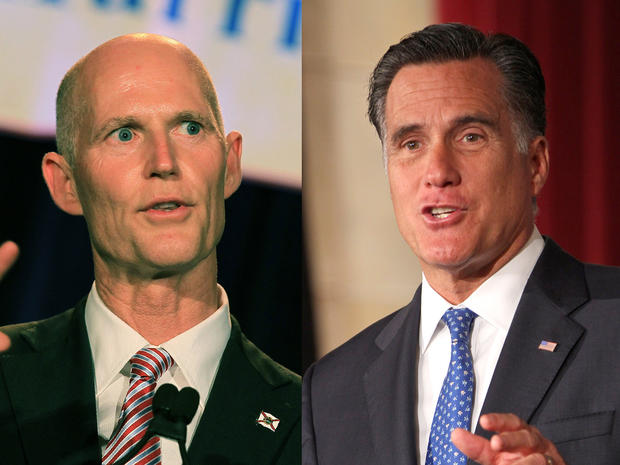The business of being a political businessman
(CBS News) Mitt Romney is a business guy. That is the core of his campaign. He promises that he will balance budgets, spend wisely and manage complexity just as he did in his 25 years at Bain. His wise attention to money is so thorough it even extends to his personal habits. On the campaign trail he does his own laundry in hotel sinks along the way so as not to waste a single dime (literally).
Will voters buy this pitch? In Florida they already have a model they can look at. Rick Scott, the former Chief Executive of Columbia/HCA, ran as a wealthy businessman who could straighten out government. But he has had mixed results which may be a cautionary political tale for Romney about the limits of applying the businessman's approach to the world of politics.
Romney has campaigned with Florida's popular Republican senator, Marco Rubio. He has also campaigned with governors like John Kasich in Ohio and Butch Otter in Idaho. But Romney has not yet shared the stage with Rick Scott, whose pragmatic approach to governing shares so much in common with Romney. The explanation, say local Florida strategists, is that Scott is not popular. In the latest polling from Suffolk University in early May, 45 percent of respondents had an unfavorable view of Scott; only 37 percent had a favorable one. Forty-four percent of respondents said they disapproved of the job he was doing, while 42 percent said they approved.
Like Romney, Florida's Scott spent decades in the private sector before moving into public office. The Republican governor made hundreds of millions of dollars founding and running a massive health care company and then working as a venture capitalist. Running on the platform of being a candidate who could balance the books in 2010, he was buoyed up by conservative and Tea Party Floridians desperate to get the state's economic house in order.
Scott's staff says he has stayed true to his businesslike mindset throughout his tenure. Communications Director Brian Burgess says that his boss wakes up every morning with a list of things he hopes to tick off, and is "methodical in how he goes about it." He campaigned on a 7-7-7 plan: Seven steps to creating 700,000 jobs in seven years.
The data driven psyche means his bottom line in decision making always ultimately comes down to reducing spending. Focusing on lowering costs as opposed to raising poll numbers comes with a price, Burgess admits. "In politics if you're constantly trying to keep different groups happy for re-election, it's tough to do that for the lowest cost."
One group Scott has been having trouble with recently is the Cubans. He came under fire in early May for signing a bill banning local governments from hiring firms that do work in Cuba or Syria -- and then issuing a letter calling the bill unenforceable, evoking the wrath of many in the Cuban community, as well as fellow Florida Republicans Sen. Marco Rubio and Rep. David Rivera. This voting block is one that Romney very much needs to hold onto and he has devoted a significant amount of campaign time and resources in the southern Florida area trying to do so since early in the primary.
Scott is not oblivious to his political condition. "He looks very much at the internal polling we do - but we never talk about it," said one staffer. He has taken various measures to improve his standing among the Tallahassee lawmakers with whom he must work and the interest groups that seek to derail his plans. He recently moved onto his third chief of staff, who he hopes will work best with him to keep him abreast of voters and political players he needs to gain ground with.
A Romney adviser says that the former Massachusetts governor is not avoiding Scott and that the two have a good rapport. "Scott believes the best way he can be helpful is by making sure the convention in Tampa is a success." For the moment, that means raising the gobs of money required to pull off the multi-day celebration. Romney spokesman Ryan Williams said that the two men do hope to campaign together in the future.
Florida GOP strategist Rick Wilson doesn't read into the notion that they have been keeping to separate quarters on purpose. "The two of them have a lot of similarities," he says. "Guys from the business world say 'Should we?' and guys from the government world say 'When should we start?'"
Some, however, scoff at the notion that Scott's absence from Romney's many campaign swings through the state is merely due to logistics or convention planning. "He's wildly unpopular!" says Scott Arceneaux, executive director of the Florida Democratic Party. "He's clear on the other side of the state when Romney comes to town." Arceneaux also said that Scott's stiff disposition and discomfort on ropelines has made him no friend to electorate - as well as the press - a complaint often cited by reporters covering Romney as well.
Romney's business like demeanor has also trickled into his rhetoric in ways he's been criticized for, such as making comments that voters should be able to "fire" their insurance company or saying that "corporations are people." A senior adviser says he too voraciously reads internal polls and literature about the state of the race - as a numbers wonk, he can't help it.
For better or worse, lessons from the business world are the basis for Romney's entire philosophy in how to govern. As Rick Scott is learning, it may be easier said than done.
